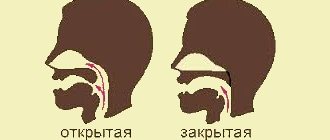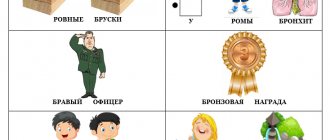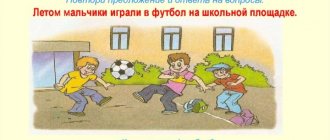“Bursty” (adjective)
The meaning of the word “burry” according to the dictionary of S. I. Ozhegov
- With unclean pronunciation of some sounds (for example, “r”, “l”)
Morphological analysis of the adjective
- I Part of speech: adjective ;
- IIInitial form: burry - singular, masculine, nominative case;
- IIIMorphological characteristics:
- A. Constant signs:
- Rank by value: qualitative
- feminine, singular, full form, positive degree
definition
nominal part of the predicate
Declension of an adjective by case
| Case | Masculine | Neuter gender | Feminine | Plural |
| Nominative | Which one? Burry | What? Burry | Which? burry | Which ones? burry |
| Genitive | What? Burry | What? Burry | Which one? burry | Which ones? |
| Dative | Which one? Burly | Which one? Burly | Which one? burry | What? Burry |
| Accusative | Which one? Which one? burry, burry | Which one? What? Burry | Which one? burry | Which ones? What? burry, burry |
| Instrumental case | What? Burry | What? Burry | Which one? burry, burry | What kind? burry |
| Prepositional | About what? | About what? | About what? burry | About what? |
Short form
| Masculine | Neuter gender | Feminine | Plural |
| What? | What's it like? | What? | What are they? |
Degrees of comparison
| Positive degree | comparative | Superlative |
| burry | burr, burr, burr, burr |
Burr - what is it and how to fix it?
Home - About speech therapy - Burr - what is it and how to fix it?
In this article we will talk about the most common sound pronunciation disorder - burr.
. Let’s figure out what “burriness” is, what types of this disorder exist, and how to overcome this problem.
The term “burr” refers to the incorrect pronunciation of the sounds “R, R”. The scientific name for this disorder of sound pronunciation is rhoticism.
Before talking about the types of burr, it is necessary to dwell on how the sound “r” is pronounced normally. The sound “r” is one of the most difficult, so it appears in speech by the age of 5-6 years and, unfortunately, is very often pronounced incorrectly.
When pronouncing the sound “r”, the mouth is open, the teeth are open, the wide tongue in the shape of a “spoon” rises to the tubercles behind the upper teeth, while the lateral edges of the tongue are pressed against the upper molars. The tip of the tongue trembles under the pressure of exhaled air. Those. It is necessary not only to clearly and high raise the tongue, to make it wide, but also to exhale very strongly so that the tip of the tongue trembles and the coveted “rrrr” is produced. If a person’s tongue muscles are not very well developed, or he cannot exhale strongly enough, and most often these two difficulties are combined, then a wide variety of sound distortions are obtained - burr.
There are 3 main groups of burr:
1 – sounds “р,р” are absent.
Example: cancer – ak; fish - fish, cow - cow.
2 – the sounds “r, r” are replaced by other sounds (most often - l, l, d, g, v).
Example: cancer - varnish, road - dovoga, chamomile - gomashka, etc.
3 – the sounds “r, r” are pronounced distorted.
The most common type of violation of the sounds “r, r” is the guttural one, when it is not the tongue that vibrates, but the soft palate (velar rhotacism) or the small uvula (uvular rhotacism).
There are also: lateral rhotacism - the lateral edge or edges of the tongue trembles, not the tip; nasal rhotacism - it is rare, the sound is pronounced with a nasal tint; coachman or labiolabial – pronounced “whoa”, lips tremble; and single-beat rhotacism - with it the tongue stands correctly, but vibrates very weakly.
While the child is small and mastering the pronunciation of sounds, parents need to monitor how their baby speaks. It is very important to notice the “burr” in time and try to correct it while the child’s psyche is plastic. If the baby correctly pronounces all the sounds of speech and only “r” does not work (misses it or replaces it with “l”, “v”), then you can wait until 5-6 years, the sound may appear on its own. But! If a child has other problems with sound pronunciation or the sound “r” begins to be pronounced burly, the likelihood that the baby will grow up and learn to speak correctly is very small. If one of the parents has a burr, then it is possible that the child will imitate his mother or father and will also burr. The optimal time to start classes to correct burr in children, if any, is 5-5.5 years
. At this age, the child is already old enough to study and will have time to correct all his difficulties by school.
I would recommend that every parent, before sending their child to school, take him for a consultation with a speech therapist, because not all kindergartens have specialists who can notice and correct burr in time. And if suddenly this problem is discovered, then during the summer holidays it can be successfully solved and the correct sound pronunciation can be formed.
Quite often they say that if in childhood it was not possible to get rid of burr, then in adolescence and adulthood
it's too late to do anything. Is this true?
The practice of speech therapy shows that burr can not only be corrected in adolescents and adults, but it can also be done quite quickly. During the consultation, the speech therapist will determine the type of burr, find the cause of the problem (which muscles of the tongue work poorly, etc.) and help you learn how to correctly pronounce the complex sounds “r, r”. As a rule, if a person does not have a violation of muscle tone, then correcting burr takes on average 10-30 sessions.
If burring prevents you from achieving your goals and causes embarrassment when communicating with others, then start working on your speech, and the experienced speech therapists at our center will help solve this problem.
Share:
Find out more about the Center's services and sign up for a consultation or lesson
You can call (812)
640-90-77
, or by filling out the form below.
"Bursty" (noun)
The meaning of the word “burry” according to the dictionary of S. I. Ozhegov
- With unclean pronunciation of some sounds (for example, “r”, “l”)
Morphological analysis of a noun
- I Part of speech: noun ;
- IIInitial form: burry - singular, nominative case;
- IIIMorphological characteristics:
- A. Constant signs:
- common noun
- animate
- feminine
- 2nd declension
- singular
subject
to appeal
nominal part of the predicate
definition-application
Declension of a noun by case
| Case | Singular | Plural |
| Nominative case who? What? | burry, burry | burry |
| Genitive case of whom? what? | burry, burry | burry |
| Dative case to whom? what? | burry, burry | burry |
| Accusative case of whom? What? | burry, burry | burry |
| Instrumental case by whom? how? | burry, burry, burry | burry |
| Prepositional case about whom? about what? | burr, burr | burry |
Meaning of the word burry
Examples of the use of the word burr in literature.
From the open windows of the landing stage restaurant you can hear the lunch hubbub, and you can hear the cafeteria radio screaming in a foreign, burry language.
Sometimes the head and hand merge, not becoming a line, but under their own voice, rolling burly, exposing the ear, like part of a centaur.
At first he ran straight through the forest, rustling in the ferns, sliding on the reddish lily of the valley leaves, and his hat hung on the back of his neck, held only by an elastic band, his knees in woolen, already city stockings were hot, he cried as he ran, cursing like a child, when a branch whipped across his forehead - and finally stopped, squatted down, out of breath, so that the loden covered his legs.
Here I ask: a nonsense anonymous and a arrogant anonymous, a kind anonymous and a most despicable anonymous, an impudent anonymous and a banal anonymous, an arrogant anonymous and a whiny anonymous, the sweetest anonymous and the rarest anonymous, an excellent anonymous and a respectable anonymous, an evil anonymous and a sheep-like anonymous, a sick anonymous and an iron anonymous , thoughtless anonymous and reasonable anonymous, hysterical anonymous and choleric anonymous, arrogant anonymous and permanent anonymous, impersonal anonymous and lyrical anonymous, aesthetic anonymous and simple anonymous, shabby anonymous and burry anonymous, humble anonymous and despicable anonymous, hacky and literary anonymous, vain anonymous and the unfortunate anonymous, the meanest anonymous and the most harmful anonymous, the dangerous anonymous and the consenting anonymous, the primitive anonymous and the parasitic anonymous, the corrosive anonymous and the fastidious anonymous, the lazy anonymous and the squalid anonymous.
Only the burr is that the Imperishable Father drives somehow - too correctly - differently than we are used to, without Pedalik’s filigree artistry, or something.
General Blokhin, having listened to the burry and laconic colonel, willingly wrote him a paper to the supply department, but warned the colonel that he would probably not receive anything on this paper earlier than in a week, because in these supply departments and at headquarters there is incredible nonsense, confusion and disgrace.
Maybe my father would have been sitting in the kitchen of his brother Vladilen, who probably chose a different path, looking at the bald, burry little Kangaroo, drinking chaga tincture with him and listening to his bug-eyed Nadya screaming: “To hell!”
And a burry, vile voice thundered in his ears: “You are at the core of the cores, Ivan!”
From the black door of the shed opposite, wide open, familiar voices could be heard: one - calm, stern and rather sad - Seryozha did not recognize at first, but the other - childishly burred and impudent - he could have distinguished from a hundred.
The bloody idol of Zhukov on a copper horse with his tail raised for need is much more suitable for our people than a burry idol from a hut.
And again an unforgettable voice sounded in Vitaly’s ears, a slightly burry, lively voice that makes life clearer.
But then Alyosha, in his unsatisfied anger, struck him with a saber, and Burr ceased to exist.
Among the new raiders, Mitka Kartavy, a former pickpocket, was especially distinguished for his audacity.
If you hand over, report that the police detained Police Officer Kartavyi.
Only the crow does not accept the snow, and you hear the crow screaming in the burry voice of a patriot.
Source: Maxim Moshkov library
Why does a person burr: the main reasons
Finally, we get to the causes of burr. One of the most common is the incorrect position of the tongue, lips, and the wrong direction of the air stream. The sound will not be clear if it is created not by vibration of the tip of the tongue, but by vibration of the lips or cheeks. Such problems are usually solved by speech therapists.
But there may be reasons of a different nature. For example, hearing loss. Then the person simply does not hear and does not understand how to pronounce the necessary sounds. Or in the family one of the parents burrs and the child simply copies this sound. Children in bilingual families often burr.
A person can also burr due to missing teeth, jaw injury, incorrect bite, or a short frenulum under the tongue, which prevents him from moving correctly. There are also reasons caused by heredity. These are structural features of the tongue, gums, teeth, and the lower jaw pushed forward.
There can be a lot of reasons. Each case must be examined individually. Sometimes even fears and stress can prevent a child from speaking correctly. In general, burring is certainly unpleasant and sometimes you have to endure ridicule, but now dentists, surgeons, orthodontists, and speech therapists are working on solving this problem and quite successfully. There would be a desire. All in your hands.
How is sound created?
There are many reasons for this type of problem. In order to understand them, let's first find out how our articulation apparatus works. What needs to be done to get clear sound?
Let's look into the mouth. To produce sound, a person uses the larynx, vocal cords, tongue, soft and hard palate, teeth of the upper and lower jaws, lips, nasopharynx, and resonator cavities. If all these parts of a large orchestra work harmoniously and correctly, pure sound is born.
One of the most important roles here is played by the vocal cords - these are muscular films located inside the larynx. If you put your hand to your throat just under your chin and pronounce the sound M, you can feel the vibrations. This is exactly what they earned; it is on the vocal cords that sound is formed. And this is how it happens.
It all starts with inhalation, through the nose or nose the air moves into the pharynx, then into the larynx, trachea, bronchi and lungs. Then, under the influence of nerve impulses from our main conductor - the brain, the vocal folds close and now you can’t just exhale. The air drawn in during inhalation is compressed under the action of the respiratory muscles and puts pressure on the ligaments, which, in turn, receiving impulses from the brain, begin to oscillate and sound is born.
By the way, the French scientist Raoul Husson showed in his work that vibration of the ligaments occurs under the influence of nerve impulses from the brain, and not just due to air pressure. But it is not exactly. His theory is not recognized by the scientific community, but it does a good job of explaining why a person who is present when other people sing begins to work on their vocal cords.
After reading, try turning on and listening to your favorite song and you will feel the tension in your throat. So, we found out how the sound arose, but what it will be like also depends on how we position the tongue, jaw and lips. For example, in order to correctly pronounce the unfortunate sound R for some, you need to open your mouth slightly, open your teeth, place the tip of your tongue on the tubercle behind your upper front teeth, then exhale long and vigorously, the tip of your tongue will begin to tremble and you will get the desired sound.






